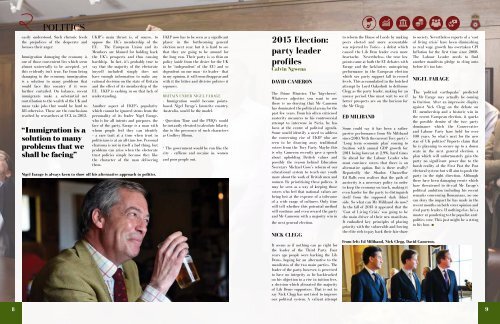The Future of Britain
You also want an ePaper? Increase the reach of your titles
YUMPU automatically turns print PDFs into web optimized ePapers that Google loves.
POLITICS<br />
easily understood. Such rhetoric feeds<br />
the prejudices <strong>of</strong> the desperate and<br />
focuses their anger.<br />
Immigration damaging the economy is<br />
one <strong>of</strong> those convenient lies which seem<br />
almost universally to be accepted, yet<br />
this evidently isn’t true. Far from being<br />
damaging to the economy, immigration<br />
is a solution to many problems that<br />
would face this country if it were<br />
further curtailed. On balance, recent<br />
immigrants make a substantial net<br />
contribution to the wealth <strong>of</strong> the UK and<br />
many take jobs that would be hard to<br />
fill otherwise. <strong>The</strong>se are the conclusions<br />
reached by researchers at UCL in 2013.<br />
“Immigration is a<br />
solution to many<br />
problems that we<br />
shall be facing”<br />
UKIP’s main thrust is, <strong>of</strong> course, to<br />
oppose the UK’s membership <strong>of</strong> the<br />
EU. <strong>The</strong> European Union and its<br />
Members are blamed for holding back<br />
the UK’s prospects and thus causing<br />
hardship. In fact, it’s probably true to<br />
say that the majority <strong>of</strong> the electorate<br />
(myself included) simply does not<br />
have enough information to make any<br />
rational decision on the state <strong>of</strong> <strong>Britain</strong><br />
and the effect <strong>of</strong> its membership <strong>of</strong> the<br />
EU. UKIP is cashing in on that lack <strong>of</strong><br />
understanding.<br />
Another aspect <strong>of</strong> UKIP’s popularity<br />
which cannot be ignored stems from the<br />
personality <strong>of</strong> its leader Nigel Farage,<br />
who is for all intents and purposes, the<br />
face <strong>of</strong> the party. Farage is a man with<br />
whom people feel they can identify<br />
– a rare trait at a time when trust in<br />
politicians is at an all-time low. Personal<br />
charisma is not in itself a bad thing, but<br />
problems can arise when the electorate<br />
trust policies simply because they like<br />
the character <strong>of</strong> the man delivering<br />
them.<br />
Nigel Farage is always keen to show <strong>of</strong>f his alternative approach to politics.<br />
UKIP now has to be seen as a significant<br />
player in the forthcoming general<br />
election next year, but it is hard to see<br />
that they are going to be around for<br />
the long run. <strong>The</strong>ir party is so thin on<br />
policy (aside from the desire for the UK<br />
to be ‘independent’ <strong>of</strong> the EU) and so<br />
dependent on one man - its leader - that<br />
in my opinion, it will soon disappear and<br />
with it the bitter and divisive policies it<br />
espouses.<br />
________________________________<br />
BRITAIN UNDER NIGEL FARAGE<br />
- Immigration would become pointsbased.<br />
Nigel Farage’s favourite country,<br />
Australia, would be the model.<br />
- Question Time and the PMQ’s would<br />
be instantly elevated to absolute hilarity<br />
due to the prescence <strong>of</strong> such characters<br />
as Godfrey Bloom.<br />
- <strong>The</strong> government would be run like the<br />
city - caffiene and cocaine in, women<br />
and poor people out.<br />
2015 Election:<br />
party leader<br />
pr<strong>of</strong>iles<br />
Calvin Ngwena<br />
DAVID CAMERON<br />
<strong>The</strong> Prime Minister. <strong>The</strong> ‘big-cheese’.<br />
Whatever adjective you want to use<br />
there is no denying that Mr Cameron<br />
has dominated the political arena for the<br />
past few years. From his <strong>of</strong>ten criticised<br />
austerity measures to his controversial<br />
attempt to intervene in Syria, he has<br />
been at the centre <strong>of</strong> political agenda.<br />
Some would identify a need to address<br />
the concerning rise <strong>of</strong> UKIP who are<br />
seen to be drawing away traditional<br />
voters from the Tory Party. Maybe this<br />
is why Cameron recently gave a speech<br />
about upholding British values and<br />
possibly the reason behind Education<br />
Secretary Michael Gove’s reform <strong>of</strong> our<br />
educational system to teach our youth<br />
more about the work <strong>of</strong> British men and<br />
women. By prioritising these polices, it<br />
may be seen as a way <strong>of</strong> keeping those<br />
voters who feel that national values are<br />
being lost at the expense <strong>of</strong> a tolerance<br />
<strong>of</strong> a wide range <strong>of</strong> cultures. Only time<br />
will tell whether this potential method<br />
will continue and even reward the party<br />
and Mr Cameron with a majority win in<br />
the next general election.<br />
NICK CLEGG<br />
It seems as if nothing can go right for<br />
the leader <strong>of</strong> the Third Party. Four<br />
years ago people were backing the Lib<br />
Dems, hoping for an alternative to the<br />
manifestos <strong>of</strong> the two main parties. <strong>The</strong><br />
leader <strong>of</strong> the party, however, is perceived<br />
to have no integrity as he backtracked<br />
on his objection to a rise in tuition fees,<br />
a decision which alienated the majority<br />
<strong>of</strong> Lib Dems supporters. That is not to<br />
say Nick Clegg has not tried to improve<br />
our political system. A valiant attempt<br />
to reform the House <strong>of</strong> Lords by making<br />
peers elected and more accountable<br />
was rejected by Tories - a defeat which<br />
caused the Lib Dem leader even more<br />
heartache. Nevertheless, the true low<br />
points came at both the EU debates with<br />
Farage and the lacklustre, uninspiring<br />
performance in the European election<br />
which saw party support fall to record<br />
levels. This accumulatied in the botched<br />
attempt by Lord Oakeshott to dethrone<br />
Clegg as the party leader, making for an<br />
uneasy period. One must wait to see if<br />
better prospects are on the horizon for<br />
the Mr Clegg.<br />
ED MILIBAND<br />
Some could say it has been a rather<br />
passive performance from Mr Miliband<br />
since 2010. With the current Tory party’s<br />
‘Long term economic plan’ coming to<br />
fruition with annual GDP growth for<br />
2014 being forecast at 2.9%, hard times<br />
lie ahead for the Labour Leader who<br />
must convince voters that there is an<br />
alternative option. But is there really?<br />
Reportedly the Shadow Chancellor<br />
Ed Balls even realises that the path <strong>of</strong><br />
austerity is a necessary policy in order<br />
to keep the economy on track, making it<br />
even harder for the party to distinguish<br />
itself from the supposed dark (blue)<br />
side. So what can Mr Miliband do now?<br />
In the fall <strong>of</strong> 2013 it appeared that the<br />
‘Cost <strong>of</strong> Living Crisis’ was going to be<br />
the main driver <strong>of</strong> their new manifesto.<br />
It embodied key principles <strong>of</strong> placing<br />
priority with the vulnerable and forcing<br />
the elite rich to pay back their fair share<br />
to society. Nevertheless reports <strong>of</strong> a ‘cost<br />
<strong>of</strong> living crisis’ have been diminishing<br />
as real wage growth has overtaken CPI<br />
Inflation for the first time since 2008.<br />
<strong>The</strong> Labour Leader needs to find<br />
another manifesto pledge to cling onto<br />
before it’s too late.<br />
NIGEL FARAGE<br />
From left: Ed Miliband, Nick Clegg, David Cameron.<br />
<strong>The</strong> ‘political earthquake’ predicted<br />
by Mr Farage may actually be coming<br />
to fruition. After an impressive display<br />
against Nick Clegg on the debate on<br />
EU membership and a historic win in<br />
the recent European election, it sparks<br />
the possible demise <strong>of</strong> the two- party<br />
dominance which the Conservative<br />
and Labour Party have held for over<br />
100 years. So what’s next for the new<br />
star <strong>of</strong> UK politics? Reports claim that<br />
he is planning to secure up to a dozen<br />
seats in the next general election, a<br />
plan which will unfortunately gain the<br />
party no significant power due to the<br />
harsh reality <strong>of</strong> the First Past the Post<br />
electoral system but will aim to push the<br />
party in the right direction. Although<br />
there have been damaging events which<br />
have threatened to de-rail Mr Farage’s<br />
political ambition including his recent<br />
remarks concerning Romanians, no one<br />
can deny the impact he has made in the<br />
recent months on both voter opinion and<br />
rival party leaders. If nothing else, he’s a<br />
master at pandering to the populist antipolitics<br />
vote. This just might be a string<br />
to his bow. ƒ<br />
8<br />
9




